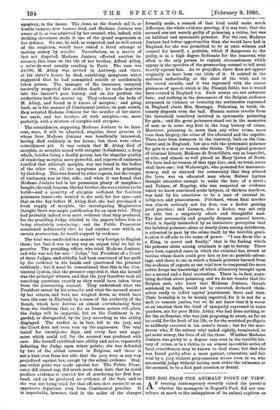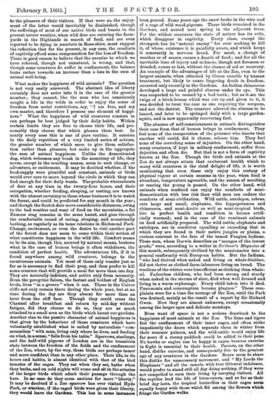THE ZOO FROM THE ANIMALS' POINT OF VIEW.
AN evening contemporary recently raised the question whether the menagerie in Regent's Park did not con- tribute as much to the unhappiness of its animal captives as
to the pleasure of their visitors. If that were so, the enjoy- inent of the latter would inevitably be diminished, though the sufferings of most of our native birds and beasts in the present severe weather, when wild deer are entering the farm- yards in the Highlands in search of food, and are even reported to be dying in numbers in Ross-shire, must suggest the reflection that for the present, in any case, the comforts of captivity afford some compensation for the loss of freedom. There is good reason to believe that the surmise to which we have referred, though not unnatural, is wrong, and that, though some creatures do suffer in confinement, the balance leans rather towards an increase than a loss in the sum of animal well-being.
What makes the happiness of wild animals ? The question is not very easily answered. The abstract idea of liberty certainly does not enter into it in the case of the greater number ; they cannot, like the man who has consciously sought a life in the wilds in order to enjoy the sense of freedom from social restrictions, say, "I am free, and my own master, and therefore I possess one element of happi- ness." What the happiness of wild creatures consists in can perhaps be best judged by their daily habits. Within certain limits they are free to choose their life, and pre- sumably they choose that which pleases them best. In nearly every case this is one of pure routine. It consists in the daily repetition of a very limited series of actions, the greater number of which seem to give them satisfac- tion rather than pleasure, but make up in the aggregate the sum of animal happiness. Unlike the domesticated -dog, which welcomes any break in the monotony of life, they never, except in the courting season, seem to seek change, or adventure, or excitement. It may be doubted whether, if the food-supply were plentiful and constant, animals or birds would ever care to move beyond the circle in which they can find enough for their daily wants. The probable whereabouts of deer at any time in the twenty-four hours, and their occupation, whether feeding, sleeping, or resting, are known with the utmost certainty to those whose business it is to watch the forest, and could be predicted for any month in the year; and though the Scotch deer move considerable distances, owing to the bad weather and want of food on the mountains, a fat Exmoor stag remains in the same haunt, and goes through the comfortable round of eating, sleeping, and occasionally bathing, as regularly as its tame relations in Richmond Park. Change, excitement, or even the desire to visit another part of the forest does not seem to come within their notion of what constitutes happiness in the wild life. Comfort seems to be its aim, though this, secured by natural means, bestows what in the case of human beings it often withdraws, the condition of perfect health. The adventurous life, if it is found anywhere among wild creatures, belongs to the carnivorous animals. Yet most of these only wander just so far as is necessary to find their prey, and then prefer to kill some creature that will provide a meal for more than one day. They are naturally indolent, and active only from necessity. Even the peregrine falcon, the fastest and boldest of English birds, lives "in a groove" when it can. Those in the Culver cliffs not only remain there daring the whole year, but at no time during the day are they absent for more than an hour from the cliff face. Though they could cross the Channel after breakfast and return by mid-day without fatigue, did they choose to do so, they are as much attached to a small area as the birds which haunt our gardens. Another clue to the passive character of animal happiness is that given by the behaviour of those creatures which have voluntarily established what is called by naturalists " com- mensalism " with man, living only where he lives, and feeding on what, inn sense, "falls from his table." Sparrows, starlings, and the half-wild pigeons of London are in the transition state between the freedom of the fields and the confinement of the Zoo, where, by the way, these birds are perhaps tamer and more confident than in any other place. Their life, in its hours and habits, is almost identical with that of the bird inmates of the cages. They eat when they eat, bathe when they bathe, and on cold nights will come and sit in the aviaries of the larger birds which admit their passage through the bars. In no ease do they seem anxious for more "liberty." It may be doubted if a Zoo sparrow has ever visited Hyde Park, or whether, if the caged birds were given their liberty, they would leave the Gardens. This has in some instances been proved. Some years ago the snow broke in the wire roof of a cage of wild wood-pigeons. These birds remained in the Gardens, and nested next spring in the adjacent trees. For the wildest creatures the state of nature has its evils, which disappear in captivity. Every class, except the strongest, has its "natural enemy" for ever seeking to kill it, of Whose existence it is painfully aware, and which keeps it constantly in nervous dread. For most, a change of weather or of season causes a dearth of food ; and for all the inevitable time of injury and sickness, though not foreseen or dreaded, comes at last, without the chance of aid or recovery. An example of the advantages of life at the Zoo, even to the largest animals, when attacked by illness curable by human treatment, but likely to cause lingering death in freedom, occurred only recently in the Gardens. An Indian rhinoceros developed a large and painful abscess under its eye. This was suspected to be caused by a bad tooth ; but as it ate the twigs of a birch-broom which was cat up and given to it, it was decided to treat the case as one requiring the surgeon, and not the dentist. The creature allowed the abscess to be lanced, and later to be syringed daily with a large garden- squirt, and is now apparently recovering fast.
The absence of self-consciousness in animals distinguishes their case from that of human beings in confinement. They feel none of the exasperation of the prisoner who knows that another will could, did it choose, release him. They feel none of the corroding sense of injustice. On the other hand, many creatures, if kept in solitary confinement, suffer from dejection and often die. But that is not a form of captivity known at the Zoo. Though the birds and animals at the Zoo do not always attain that exuberant health which to many wild creatures is the chief delight of life, it is worth mentioning that even these only enjoy this ecstasy of physical vigour at certain seasons in the year, when food is abundant, temperature agreeable, and the season of moulting or rearing the young is passed. On the other hand, wild animals when confined can enjoy the comforts of semi- domestication with less risk than wild men can endure the comforts of semi-civilisation. Wild cattle, antelopes, zebras, cats large and small, elephants, the hippopotamus and rhinoceros, and semi-Arctic as well as semi-tropical birds, live in perfect health and condition in houses artifi- cially warmed; and in the case of the ruminant animals on food artificially prepared. The wild cattle, elephants and antelopes, are in condition equalling or exceeding that in which they are found in their native jungles or plains, a curious contrast to the fate of the tamed Faegian Indians. These men, whom Darwin describes as "savages of the lowest grade," were, according to a writer in Scribner's Magazine of this month, subsequently civilised by the missionaries into a general conformity with European habits. But the Indians, "who had thrived when naked and living on whale-blubber, did not thrive as clothed farm-labourers living on bread. The woollens of the whites were less efficient as clothing than whale. oil. Fatherless children, who had been strong and sturdy when naked in the storms of sleet, died when well dressed and living in a warm orphanage. Every child taken into it died. Pneumonia and consumption became plagues." These com- plaints were for a time the scourge of the Zoo, until the Park was drained, mainly as the result of a report by Sir Richard Owen. Now they are almost unknown, except occasionally among the larger apes and delicate monkeys.
Even want of space is not a serious drawback to the happiness of most animals at the Zoo. The lions and tigers feel the confinement of their inner cages, and often strike impatiently the doors which separate them in winter from their summer palaces, and the wild-cattle would enjoy life far more if a roomy paddock could be added to their pens. No hawks or eagles can be happy in cages, because exercise in flight is essential to their health. Parrots, on the other hand, dislike exercise, and consequently live to the greatest age of any creatures in the Gardens. Bears seem to share this dislike for unnecessary movement, and "My Lords the Elephants" and all the camels, with true Oriental indolence, would prefer to stand still all day doing nothing, if they were not compelled to earn their living by carrying visitors. All the reptiles lead the life of lotus-eaters, and so far as their brief day lasts, the tropical butterflies in their cages seem eqriiilly happy with those which flit among the flowers which fringe the Garden walks.







































 Previous page
Previous page